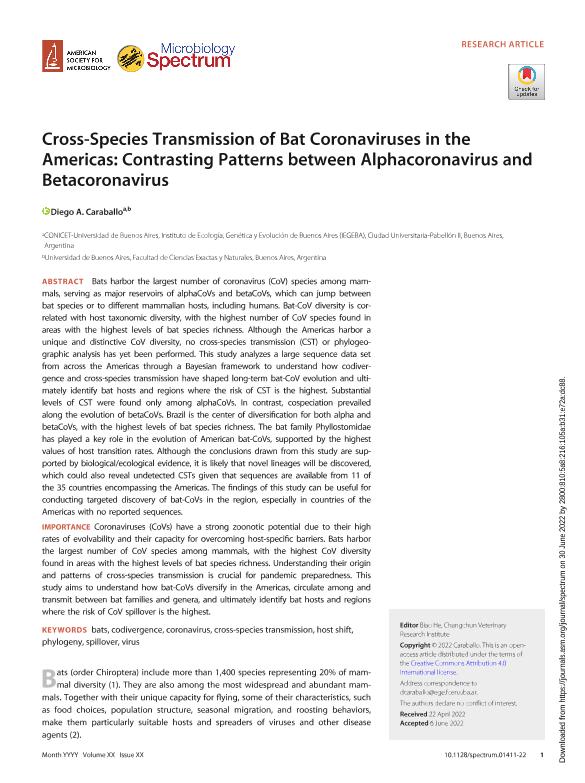Mostrar el registro sencillo del ítem
dc.contributor.author
Caraballo, Diego Alfredo

dc.date.available
2023-10-05T10:42:12Z
dc.date.issued
2022-06
dc.identifier.citation
Caraballo, Diego Alfredo; Cross-Species Transmission of Bat Coronaviruses in the Americas: Contrasting Patterns between Alphacoronavirus and Betacoronavirus; American Society for Microbiology; Microbiology Spectrum; 10; 4; 6-2022; 1-13
dc.identifier.issn
2165-0497
dc.identifier.uri
http://hdl.handle.net/11336/214152
dc.description.abstract
Bats harbor the largest number of coronavirus (CoV) species among mammals, serving as major reservoirs of alphaCoVs and betaCoVs, which can jump between bat species or to different mammalian hosts, including humans. Bat-CoV diversity is correlated with host taxonomic diversity, with the highest number of CoV species found in areas with the highest levels of bat species richness. Although the Americas harbor a unique and distinctive CoV diversity, no cross-species transmission (CST) or phylogeographic analysis has yet been performed. This study analyzes a large sequence data set from across the Americas through a Bayesian framework to understand how codivergence and cross-species transmission have shaped long-term bat-CoV evolution and ultimately identify bat hosts and regions where the risk of CST is the highest. Substantial levels of CST were found only among alphaCoVs. In contrast, cospeciation prevailed along the evolution of betaCoVs. Brazil is the center of diversification for both alpha and betaCoVs, with the highest levels of bat species richness. The bat family Phyllostomidae has played a key role in the evolution of American bat-CoVs, supported by the highest values of host transition rates. Although the conclusions drawn from this study are supported by biological/ecological evidence, it is likely that novel lineages will be discovered, which could also reveal undetected CSTs given that sequences are available from 11 of the 35 countries encompassing the Americas. The findings of this study can be useful for conducting targeted discovery of bat-CoVs in the region, especially in countries of the Americas with no reported sequences.
dc.format
application/pdf
dc.language.iso
eng
dc.publisher
American Society for Microbiology

dc.rights
info:eu-repo/semantics/openAccess
dc.rights.uri
https://creativecommons.org/licenses/by-nc-sa/2.5/ar/
dc.subject
BATS
dc.subject
CODIVERGENCE
dc.subject
CORONAVIRUS
dc.subject
CROSS-SPECIES TRANSMISSION
dc.subject
HOST SHIFT
dc.subject
PHYLOGENY
dc.subject
SPILLOVER
dc.subject
VIRUS
dc.subject.classification
Virología

dc.subject.classification
Ciencias Biológicas

dc.subject.classification
CIENCIAS NATURALES Y EXACTAS

dc.subject.classification
Biología

dc.subject.classification
Ciencias Biológicas

dc.subject.classification
CIENCIAS NATURALES Y EXACTAS

dc.title
Cross-Species Transmission of Bat Coronaviruses in the Americas: Contrasting Patterns between Alphacoronavirus and Betacoronavirus
dc.type
info:eu-repo/semantics/article
dc.type
info:ar-repo/semantics/artículo
dc.type
info:eu-repo/semantics/publishedVersion
dc.date.updated
2023-07-07T22:22:43Z
dc.journal.volume
10
dc.journal.number
4
dc.journal.pagination
1-13
dc.journal.pais
Estados Unidos

dc.description.fil
Fil: Caraballo, Diego Alfredo. Consejo Nacional de Investigaciones Científicas y Técnicas. Oficina de Coordinación Administrativa Ciudad Universitaria. Instituto de Ecología, Genética y Evolución de Buenos Aires. Universidad de Buenos Aires. Facultad de Ciencias Exactas y Naturales. Instituto de Ecología, Genética y Evolución de Buenos Aires; Argentina
dc.journal.title
Microbiology Spectrum
dc.relation.alternativeid
info:eu-repo/semantics/altIdentifier/url/https://doi.org/10.1128/spectrum.01411-22
dc.relation.alternativeid
info:eu-repo/semantics/altIdentifier/doi/http://dx.doi.org/10.1128/spectrum.01411-22
Archivos asociados
